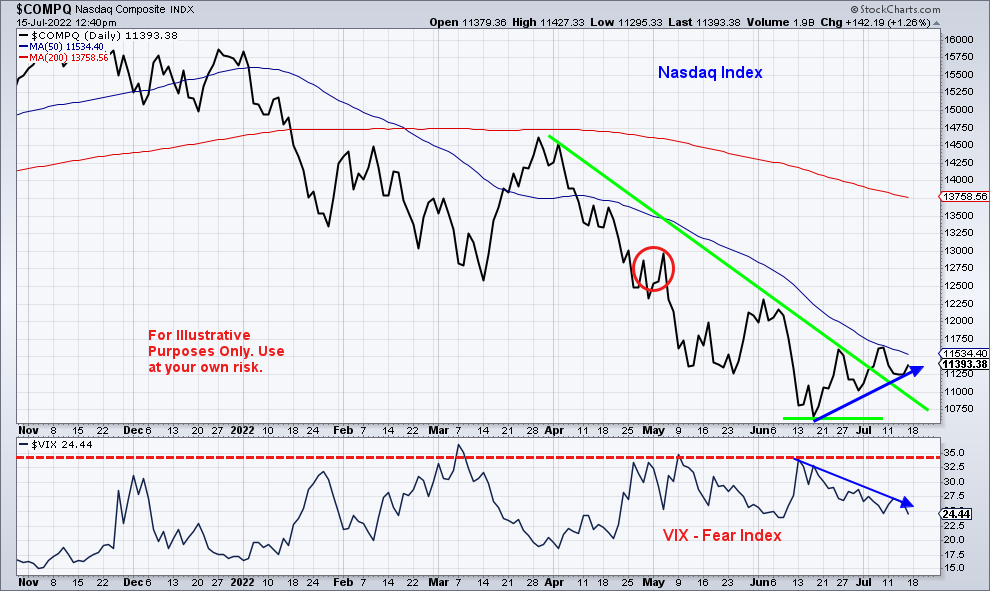In January of 2007, Steve Jobs changed the world as we know it by introducing the iPhone, which essentially put a pocket computer in the hands of the masses. Before long, all types of media became a constant presence in our lives. Kids born this century will have no memory of life without a smartphone and the instant access to information it provides. Information comes at us so quickly and can turn on a dime just as quickly. Facts that reporters reported with certainty 30 minutes before turn out to not really be facts, after all. Instead, they are someone’s spin on events designed to create fear, anger, or sympathy depending on the reporter’s allegiances. But mostly news outlets are tasked with bringing in more viewers or garnering more clicks because that is how the media make money.
Clicks for Profit
Sadly, the financial media is no different. They need to create a reason for viewers to tune in or readers to click on their website. If their website traffic metrics are good, then they attract more advertisers and can grow their ad revenue—the primary goal.
Headlines for Clicks
Fear is universally considered one of the strongest human emotions, and the media knows this and capitalizes on it. Consider these headlines this week from the business pages of CNN, Kiplinger, and CNBC.
The Market Meltdown Threatening Pensions for Millions of Americans
By Nicole Goodkind, CNN Business
Updated 1:06 PM ET, Thu July 14, 2022
A Truly Massive Interest Rate Hike is Now on the Table
By Julia Horowitz, CNN Business
Updated 8:33 AM ET, Thu July 14, 2022
Inflation Will Stay Near 9% the Rest of This Year
Kiplinger’s latest forecast on inflation
by: David Payne July 13, 2022
ECONOMY: Inflation rose 9.1% in June, even more than expected, as consumer pressures intensify
WED, JUL 13 20228:31 AM EDTUPDATED WED, JUL 13 20226:07 PM EDT
Jeff Cox @JEFF.COX.7528 @JEFFCOXCNBCCOM
JPMorgan CEO Dimon sums up U.S. economy in one paragraph — and it sounds bad
THU, JUL 14 20223:50 PM EDTUPDATED THU, JUL 14 20224:26 PM EDT
Fred Imbert @FOIMBERT
Media companies have become very sophisticated by engineering news feed algorithms to take note of not only what is clicked on, but also who is clicking on it to make sure we are fed the perfect headlines that lure us into even more clicks. Usually sensationalized, over-the-top stories are frequently manipulated to lead to end-of-the world type scenarios.
Inflation Example
Typically, the stock market is a leading indicator for the economy because economic data looks backward, while the markets price stocks based on future valuations. So, when inflation numbers were reported this week, and inflation was up 9% for June, the markets had already taken that into account. The media then acts like no one saw this coming, which makes me wonder if they ever go to the grocery store or the gas station.
Manipulation
Wall Street executives often make appearances on financial news shows to offer dire predictions for the future and scare traders and investors into selling their stocks. But guess who is buying up those stocks? Since the end of April, QQQ (Nasdaq ETF), which is a higher risk ETF, has sold off in the morning hours when the market opens, only to have buyers come in during the afternoon. Those buyers are Wall Street firms looking to buy the dips because they think the markets are reaching the bottom of this correction despite what their spokesperson said on CNBC this morning.
The chart below of the Nasdaq Index indicates that over the last month it has made higher lows and higher highs (blue arrow). The VIX chart (called the fear index), just below the Nasdaq, has been moving down the last month which indicates the fear is decreasing among traders and they are more willing to buy stocks.
The Nasdaq could just as easily turn and resume its downtrend over the rest of the summer. However, some commodity prices are dropping, and the Fed has hinted that they may not raise interest rates quite as high at their July meeting as they previously stated. So the probabilities of being at the bottom are improving (I’ll cover that in the next blog), which is why we see Wall Street starting to accumulate a few shares.
Intended Results
By stoking fear, the media can increase their advertising revenue and Wall Street firms can take advantage of nervous investors selling near the bottom to set themselves up for higher future returns. The average investor is left second guessing themselves which leads to higher anxiety, which then leads to even more poor decision making. Yet we continue to feed the algorithms more information with every click as we look for the answers, and that allows the media to entice us to engage with them even more and continue the cycle.
Turn Off the Noise
While it is nearly impossible to disengage completely from media, the best way to decrease stress and gain some perspective is to turn off the TV, set down our phone or walk away from the computer on a regular basis and do something that will clear our heads. If we recognize what the media is trying to do to us and refuse to participate except on our own terms, then we can improve our decision making by not allowing ourselves to be drawn into the misconceptions they create.


Recent Comments